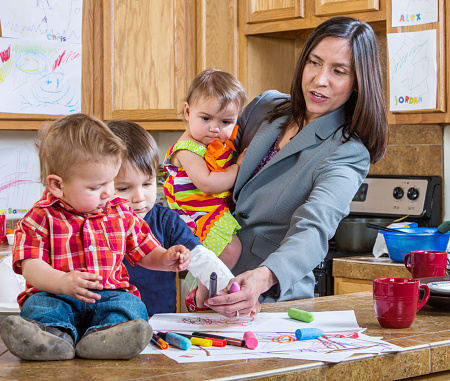Why You Gain Weight As You Age & What You Can Do About It
Article posted in: Lifestyle
Years before you find your first line, wrinkle or gray hair, your body is letting you know it’s aging. Your first clue? You just can’t eat what you used to without the fear of weight gain.
One of the reasons even your 20-something self can’t scarf down a pizza, soda and hot fudge sundae every Friday night and still stay slim the way you did in high school is your basal metabolic rate. Simplified, that’s the rate at which your body burns calories just to keep chugging along every day. It’s sometimes called resting metabolic rate because it reflects your body’s needs at rest. This rate drops about one to two percent every decade, according to the American Council on Exercise.
That calorie-burning rate peaks in your late teens and 20s. But by the time you’re in your 70s, it’s 20-25 percent lower than when you started out, says a 2015 study in the journal Medicine & Science in Sports & Exercise that looked at research from nearly 200 studies of metabolic rate in various age-groups and populations. Women’s metabolic rates start out and continue to be lower than men’s, in part because of the disparity in muscle mass, the study noted. (Muscles burn calories.)
But don’t despair. You’re not totally the victim of your body’s aging engine. Much of the age-related weight gain is linked to how we eat and how much we exercise. The first often goes up while the second goes down over the years. That fix is in your hands. Eating smarter and making exercise a priority can boost your metabolism so age simply becomes just another number.
Here’s what you need to know about why you gain weight as you age:
Your 20s
Why am I gaining weight?
Remember all that talk about the “freshman 15?” That’s the idea that college freshmen pile on about 15 pounds as they navigate the meal plan, dorm temptations and stress eating that comes with college. Good news: It’s mostly a myth. Bad news: The mythical part is the 15. Most college students do gain weight—a moderate amount, according to the American Academy of Nutrition and Dietetics. But chances are you’re carrying that freshman weight into your 20s. Add to that your first job (usually sedentary), your first cooking experience (yes, eating out of a box or takeout bag is easier, but more fattening), weekend indulgences (one pint of beer is about 200 calories according to the U.S. Department of Agriculture nutrient database and, like other adults over 18, the fact that you don’t exercise very much. Your metabolic rate may be peaking, but your lifestyle is starting to circle the drain. In fact, according to data published by the Centers for Disease Control and Prevention (CDC), all of this contributes to making your 20s your prime weight-gaining years.
What can I do?
Grab your life by the reins. While it’s easier to rely on drive-thru cuisine, there are better, healthier ways to eat that don’t require hours in the kitchen. Nutrisystem may be a perfect choice for you. It’s made for busy people. Not only do you get home-delivered, perfectly portioned meals designed to help you lose weight safely and get healthy, the program helps you learn how to prepare those same kinds of meals for yourself almost from the get-go. That’s right—a bonus cooking class. At the market, look for pre-cut veggies and fruits which will save you meal prep time. And even though you’re busy, make exercise a priority. Schedule a daily walk before or after work or at lunchtime with a coworker. If you can’t afford a gym membership (hint, hint: Some cost as little as $10 a month), buy an inexpensive set of hand and leg weights and follow a strength-training program for free on YouTube or, better yet, check out our Fitness section for some quick and easy activities that torch calories.
Check out these 10 tips for losing weight in your 20s! >
Your 30s
Why am I gaining weight?
Unfortunately, if your college weight gain turned into your 20s weight gain, you’re starting this decade at a disadvantage. And for many people that’s exactly what happens. According to the CDC, the average man in his 20s weighs 185 pounds but hits his 30s at nearly 200 pounds. Women go from 162 to 170 pounds. You may still have a sedentary lifestyle thanks to a commute and a desk job which can also lead you to the takeout counter more than you’d like. Women may have baby weight to deal with (along with all the stresses of parenthood that they share with their partners) and even less time to hit the gym. Sadly, your metabolism and your muscles aren’t cooperating. When you hit your 30s, you start losing muscle mass (called sarcopenia) which can put the brakes on how well your body burns calories. In the 30s decade, both men and women start losing it at the rate of three to five percent per decade, say Harvard experts.
What can I do?
With loss of muscle mass comes loss of strength (up to a 40 percent drop once you’re over 40, in one study) and depletion of your fat-burning capacity. To borrow a line from the classic Saturday Night Live bodybuilder characters Hans and Franz, you’ve got to “pump you up!” You don’t need a body builder’s bulging biceps. You just need strong, firm muscles all over, which means a full-body workout two to three times a week. One of the benefits of strength-training is that it also boosts the hormones that help you build lean mass and have more energy, which you’ll need to keep up with the kiddies, says the American Council on Exercise. It will also help build up bone density. That also flags as you age.
Time constraints make healthy eating tough, so look for shortcuts like healthy prepared meals. Use baby’s nap time on the weekend to cook for the week. Or start a cooking group with other busy parents who prepare meals together or parts of meals separately at home so each family is ready for the week. (You can do this if you’re single, too!) Check out our Recipe Center for great healthy recipes (including slow cooker recipes for the super busy folks!).
Check out these 10 tips for losing weight in your 30s! >
Your 40s and 50s
Why am I gaining weight?
Some weight gain after 40 seems to be unavoidable. A 1997 study found that even avid runners put on pounds and inches if they didn’t up their mileage as they aged. (Add 1.4 miles every year, the researchers advised.) A 2006 follow-up study confirmed those results.
Hormones—or their absence—may play a role, but the leading theories about middle-age weight gain is that dwindling muscle mass may be a major culprit. You may not be as active as your kids have gotten older. There’s no more lifting toddlers in and out of the car or playing catch at the park. Muscle helps boost your metabolism and as it disappears, your ability to burn calories slows. A 2017 government study also identified an enzyme that increases activity with age. Their study looked at mice who, when given a hefty dose of a chemical that inhibited the activity of the enzyme, experienced a 40 percent drop in weight gain even though they were eating high-fat foods.
What can I do?
Up your exercise and focus on strength training to help prevent loss of that precious lean muscle mass that will help you torch calories. And a healthy diet helps. A 2011 study published in the New England Journal of Medicine, looking at long-term weight loss patterns among 120,000 adults 33-60, found that that those who ate junk food like chips, fries, soda and lunch meat, gained anywhere from 1 to 3.4 pounds over four years. (It doesn’t sound like much until you start adding it up.) On the other hand, those who turned to foods such as daily servings of yogurt, fruits and nuts, gained less than a pound over four years. Likewise, those who put the jets on their exercise program gained fewer middle-age pounds. TV watching and sleeping less than six hours or more than eight hours a night were also linked to middle-age weight gain.
Check out these 10 tips for losing weight in your 40s and 50s! >
Your 60s and Up
Why am I gaining weight?
Here’s a little good news: You may not be. According to the CDC, age-related weight gain slows down and plateaus by the time you’re in your 60s. Your biggest problem may be whittling down the pounds you’ve accumulated over the previous decades. Sad to say, weight loss is one thing that doesn’t get easier with age. In fact, since you’re not the calorie-burning machine you once were even a decade before, it’s tougher to shed fat. Your body doesn’t need as many calories as it used to, and if you’re dealing with a pain issue, such as arthritis, you may not be as active as you should be.
What can I do?
Just because it’s a little harder, doesn’t mean it’s not possible to lose weight after 60. In one 2011 study published in the New England Journal of Medicine, more than 100 volunteers over the age of 60 were assigned to one of three groups. One group was given a diet plan that cut 500 to 750 calories out of their daily calorie requirements. Another participated in three group exercise programs a week, each 90 minutes long. A third group did both diet and exercise, while the fourth group was asked to make no changes in their diet or activities. After a year, the diet and diet-exercise groups both lost weight—the diet group shed 10 percent of their pre-diet weight, while the diet-exercise volunteers lost nine percent. Those who exercised but didn’t diet lost about one percent of their weight. The control group even lost a little weight—but less than one percent.
The best part: Those who lost weight through diet and exercise were physically stronger and less frail than the other groups.
Check out these 10 tips for losing weight in your 60s and 70s! >










